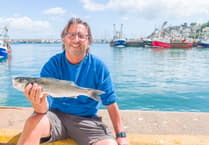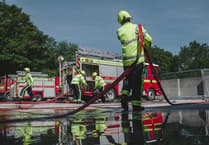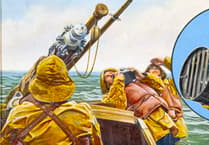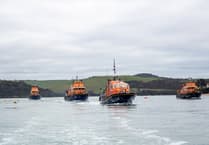A YOUNG man from Salcombe is taking on the challenge of a lifetime in memory of his father, who died in 2012 from a brain tumour.
Tom Rainey, 23, and friend Sam Coombs, 24, are rowing unsupported 3,000 miles across the North Atlantic, from New York to Salcombe, to raise money for the Brain Tumour Charity.
The pair, who met at Plymouth University, will be the youngest-ever team to row from the US mainland to the UK. They have named their venture Ocean Valour.
The route Tom and Sam have chosen is significantly more difficult and dangerous than the more commonly tackled South Atlantic crossing. Since first completed in 1896, it has been attempted by 60 crews, of which only 22 have been successful. Five teams have been lost at sea.
The record crossing was made in 55 days, and Tom and Sam are hoping to break this record when they embark on the challenge in May this year.
Tom said: 'I wanted to row this route in particular because it's badass. I love those cold, dark seas and the North Atlantic has that feel. I wanted to pick a route that would be a great homage to my father, and I think this route is perfect for that, especially as we finish in Salcombe, where he grew up and loved to be whenever he could.'
Speaking of his late father Luke Rainey, Tom said: 'He taught me everything he knew about the sea and how to sail, engraving in me a deep love for that big, blue, hostile, wavy place.'
Tom and Sam's boat has been designed and built expertly by specialist boatbuilders SeaSabre in Axminster.
'The boat's built to look after us,' stressed Sam.
The bright orange vessel is 23-feet long and six-foot wide. It carries everything they should need for the duration of their trip, including food, medical supplies and satellite communications equipment. At the stern is a tiny cabin that can fit both men at a pinch, although the plan is that one rows while the other sleeps.
There are no sails or engines – only human endeavour will power the boat across the treacherous waters.
Sam said they are both taking safety extremely seriously, and although they will be completely unsupported at sea, they have a fantastic team back in the UK with which they will be able to communicate using the most up-to-date technology, provided by one of their sponsors, Ocean Signal.
As well as a satellite phone and VHF radio, they will be taking a Yellowbrick tracker, which in addition to sending their location to their support team will also act as a back-up means of communication.
Sam said: 'Tom had the idea in the summer of 2013, I think.
'Obviously, you want to look after your mates, so I said yes, I'd do it. Ever since we thought, "let's give this thing a proper crack", we've been training hard. We're doing a lot of gym work, running and weighted walking, but we've also spent a lot more time in the boat than other teams have, practising things like putting the sea anchor out and cooking ourselves a meal.
'The thing is not to start off the row as the perfect physical athlete, but just to start off really fit and healthy.
'With all the crews in the past that have gone missing, although they've only ever found one body the boats have always been recovered. So we know we just have to stay with the boat, which is a lesson we've both learnt from dinghy sailing anyway.
'There's always a significant amount of luck involved in these things, but we're doing it for the right reason – we're doing it for the Brain Tumour Trust.'
Among Team Ocean Valour's many sponsors are Salcombe's Quba and Plymouth University.
For more information on Tom and Sam's epic challenge, visit http://www.oceanvalour.co.uk">www.oceanvalour.co.uk.




Comments
This article has no comments yet. Be the first to leave a comment.